SWEDISH SOUTH ASIAN STUDIES NETWORK
Visit to Delhi University,
Monday 5 November 2007
Web page: http://www.du.ac.in/
 The University of Delhi is one of the three big universities in the city, JNU and Jamia Islamia being the two others. The university is spread out in two campus areas, both located close to the Ridge crossing Delhi from northeast to southwest. The North Campus, north of Old Delhi and the Civil Lines, is the major one with most of the departments and schools, and also the place where the Vice-Chancellor’s office is located (in the Viceregal Lodge, the heritage building where the last British Viceroy, Lord Mountbatten resided till August 1947, see photo).
The University of Delhi is one of the three big universities in the city, JNU and Jamia Islamia being the two others. The university is spread out in two campus areas, both located close to the Ridge crossing Delhi from northeast to southwest. The North Campus, north of Old Delhi and the Civil Lines, is the major one with most of the departments and schools, and also the place where the Vice-Chancellor’s office is located (in the Viceregal Lodge, the heritage building where the last British Viceroy, Lord Mountbatten resided till August 1947, see photo).
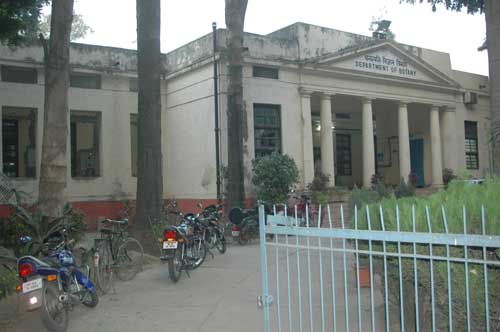 It is a complete university, with education from BA level to postgraduate studies. The 16 faculties, covering all the fields including engineering and medicine, offer a wide spectrum of undergraduate, postgraduate and doctoral programmes, within 84 departments. There are also 78 colleges in the University of Delhi, including classical institutions such as St. Stephen’s College from 1881, Hindu College from 1899, Lady Hardinge Medical College from 1916, and Shri Ram College of Commerce from 1926.
It is a complete university, with education from BA level to postgraduate studies. The 16 faculties, covering all the fields including engineering and medicine, offer a wide spectrum of undergraduate, postgraduate and doctoral programmes, within 84 departments. There are also 78 colleges in the University of Delhi, including classical institutions such as St. Stephen’s College from 1881, Hindu College from 1899, Lady Hardinge Medical College from 1916, and Shri Ram College of Commerce from 1926.
Besides this, the University has established a large number of high-quality research and development centres to promote interdisciplinary research on socially relevant issues. They include the School of Environmental Studies, and Dr. BR Ambedkar Centre for Biomedical Research. And another one of these research centres is the Developing Countries Research Centre (DCRC), that we had been invited to visit by Prof. Manoranjan Mohanty, former Director of the Centre (and the person who set up the Centre in 1993).
------------------------------------------------
Meeting at the Developing Countries Research Centre (DCRC)
Web page: http://www.dcrcdu.org/
 DCRC is located in a new-built building not far away from the North Campus. It is housed together with some other research centres, including the Institute of Life-Long Learning. The Developing Countries Research Centre studies problems of the developing countries of Asia, Africa and Latin America in a comparative perspective, with its research areas comprising of State and Civil Society, Democratic Thought and Practice, People’s Right, Women and Social Change, Culture, Society and Religion, Science, and Technology and Social Change.
DCRC is located in a new-built building not far away from the North Campus. It is housed together with some other research centres, including the Institute of Life-Long Learning. The Developing Countries Research Centre studies problems of the developing countries of Asia, Africa and Latin America in a comparative perspective, with its research areas comprising of State and Civil Society, Democratic Thought and Practice, People’s Right, Women and Social Change, Culture, Society and Religion, Science, and Technology and Social Change.
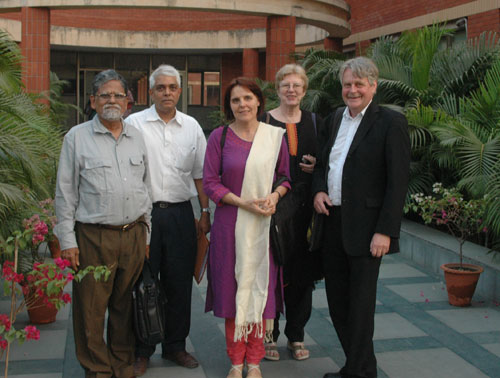 |
| After the meeting at Developing Countries Research Centre, University of Delhi, from left to right: Manoranjan Mohanty, K Srinivas, Anna Lindberg, Patricia Uberoi and Lars Eklund. |
Prof. Mohanty had invited scholars not only from CSDC itself, but also from other colleges and departments at Delhi University, mostly political scientists and economists. The new Director, Prof. Neera Chandhoke, welcomed us to the meeting held in CSDC’s conference room, in the style of the regular seminars that CSDC hold twice a month. We were able to present SASNET, and the participants at the seminar all presented their research interests to us, with a hope that SASNET might be able to identify colleagues in Sweden with similar interests, an make collaborative research projects possible.
Prof. Mohanty told about a previous research collaboration project that CSDC had with Uppsala University in the 1990s, with the Dept. of Government and Prof. Olle Törnquist (now at University of Oslo).
Our planning grants for research projects, interdisciplinary conferences and guest lecture tours can act as catalysts to realise this, and the discussion focused on different forms of collaboration, and how to find relevant information (our answer: search the SASNET website).
Regarding student exchange, Prof. Chandhoke stressed that for Delhi University it is not possible to send students on undergraduate level. They are however very keen on institutionalising exchange on PhD level.
Prof. Sreenivas, Dean of International Relations, added that for BA level students the only possibility to organise an exchange programme would be during the summer holiday, which is not a very attractive period to stay in Delhi for foreign students. On PhD level the situation is much more flexible. He also informed that students from Germany and France already come here, as part of their studies.
(It should be added that the University of Delhi as a whole attracts the largest number of international students of universities in India. MoUs have been signed and implemented with more than 15 universities, including the University of California and the University of Heidelberg. In 2005, there were about 1200 foreign students from 60 different countries enrolled in the University.)
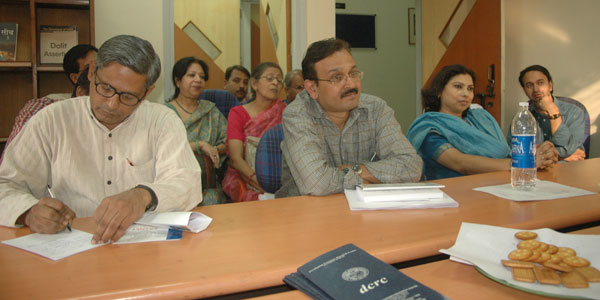 |
| Researchers at DSDC, from left to right in the front row: Ujjwal Kumar Singh, Ashok Acharya and Savita Singh. |
Participants:
• Prof. Manoranjan Mohanty, Emeritus Fellow and former Director, DCRC
• Prof. Neera Chandhoke, Director, DCRC
• Prof. K. Sreenivas, Dept. of Physics & Dean, International Relations, Delhi University
• Prof. Patricia Uberoi, Honorary Director, Chinese Studies, Prof. in Sociology. Research interest: Social anthropology; China–India. Project on ”Family, gender and kinship in NE India and SW China”.
• Dr. Ashish Ghosh, DCRC. Research interest: Performance traditions and people’s initiatives. IGNIA funded project on the Snake goddess Manasa; performance and ecological change.
• Ujjwal Kumar Singh. Dept. of Political Science. Research interest: Laws and politics in India. Extraordinary (anti-terror) laws. Politics and Institutions in India. Study of the Election Commission of India.
• Ashok Acharya. Reader, Dept. of Political Science. Research interest: Democracy and Diversity. Applied Ethics. Multiculturalism. Affirmative Action. Cross-cultural Perspectives.
• Savita Singh. Fellow, Dept. of Political Science, Dyal Singh College, Delhi University. Research interest: Indian modernity and concepts related to it: Notion of modern Indian self. Gandhi and Ethics (alternative modernity).
• Pushpa. DCRC & Dept. of Political Science, Delhi University. Research interest: Human Rights. Rights discourse in Asia. Political Theory. Women’s Rights.
• Nandini Sundar. Dept. of Sociology, and DCRC. Research interests: Political and Legal Sociology.
• Ambuja Kumar Tripathy. Lecturer in Political Science at Shri Ram College of Commerce (SRCC), Delhi University. Associate at DCRC. Research interest: Nation-state and civil society in Globalizing South Asia.
• Gyanaranjan Swain. Research Scholar, Dept. of Political Science, Delhi University. Research interest: Inequality, Amartya Sen compared to xxx.
• Madhulika Banerjee. Reader, Dept. of Political Science, Delhi University. Research interest: Ayurveda in the postcolonial period.
• Suranjita Ray. Dept. of Political Science, Daulat Ram College, Delhi University. Research interest: Poverty and hunger, comparative study incl. Kalahandi.
• N. Sukumar. Lecturer, Dept. of Political Science, Delhi University. Research interest: Human Rights. Poverty Studies. Ambedkarism & Caste studies. Dalit Politics.
• Ravi Ranjan. Dept. of Political Science, Zakir Husain College, Delhi University. Research interest: Human Security. Policies on Social Security Systems in India.
• Praveen Priyadarshi. Dept. of Political Science, Zakir Husain College, Delhi University. Research interest: Political Theory. Indian Politics.
• Dr. Monica Das. Reader in Economics. Gargi College for Women, Delhi University. Research interest: Gender Economics. Also involved in filmmaking, and freelance small-time performer.
• Dr. Biswajit Mohanty. Senior Lecturer, Deshbandhu College, Delhi University. Research interest: Dam projects and displacement of tribals in Orissa.
• Atreyi Majumdar. Reader in Economics, Gargi College for Women, Delhi University. Research interest: Migration in the informal sector in India. Demographics, declining sex ratio.
We also met Prof. K.N. Tripathi, Dean Research & Director, Institute of Life-Long Learning, Delhi University.
(Staffan Lindberg and Lars Eklund also met Prof. Mohanty and some of his colleagues at DCRC during their SASNET South Asian contact journey in March 2002. Read the report from the meeting.)
Meeting with Prof. Deepak Pental, Vice-Chancellor, Delhi University
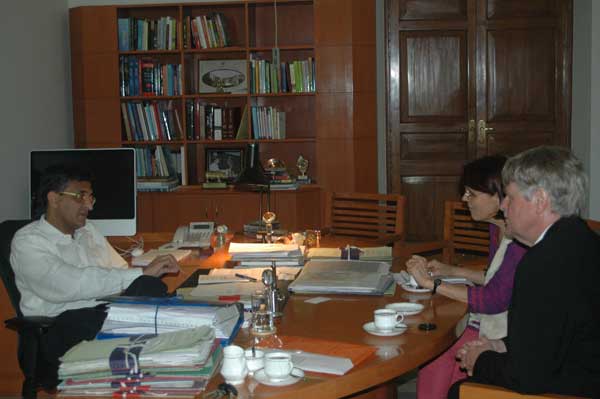 From DCRC we proceeded by car to the main (north) campus of Delhi University, located nearby. We were accompanied by Prof. K Sreenivas, Dean, International Relations, who showed us around the beautiful campus area, and at 6 P.M. we had a meeting with the Vice Chancellor (VC), Prof. Deepak Pental, in his office. In spite of a hectic schedule Prof. Pental showed great interest in our presentation of SASNET. Only a couple of days before we read in the newspaper that Prof. Pental was conferred the Officier Des Palmes Academiques Award by the French Higher Education and Research Minister Velerie Pecresse (on the same day that the Swedish Embassy held its reception in honour of SASNET, an event to which Prof. Pental of course was invited).
From DCRC we proceeded by car to the main (north) campus of Delhi University, located nearby. We were accompanied by Prof. K Sreenivas, Dean, International Relations, who showed us around the beautiful campus area, and at 6 P.M. we had a meeting with the Vice Chancellor (VC), Prof. Deepak Pental, in his office. In spite of a hectic schedule Prof. Pental showed great interest in our presentation of SASNET. Only a couple of days before we read in the newspaper that Prof. Pental was conferred the Officier Des Palmes Academiques Award by the French Higher Education and Research Minister Velerie Pecresse (on the same day that the Swedish Embassy held its reception in honour of SASNET, an event to which Prof. Pental of course was invited).
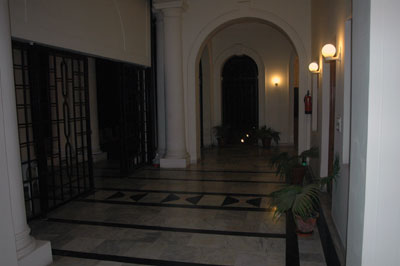 |
| The Vice-Chancellor’s office has a a royal flavour, since it is located in the Viceregal Lodge, the heritage building where the last British Viceroy, Lord Mountbatten resided till August 1947. |
Anna presented ideas about organising joint courses for Indian and Swedish students with the studies taking place partly in Sweden and partly in India, an idea for which also Prof. Sreenivas is in favour. The VC was positive to the idea in general, but stressed (just like Prof. Chandhoke) that student exchange on BA level is not possible. Exchange on doctoral level, however, is much welcome.
We also discussed the fact that Delhi University recently, as the first Indian university, has become a member of the so-called U21 collaboration between select universities in the World. Lund University is also being a member of U21, and that could be an entry point for establishing exchange programmes between Lund and Delhi.
Prof. Pental told us that it is presently very difficult for students at the undergraduate or masters level to leave their school for extended periods of time because their courses run parallel. One possibility for Indian students might be to schedule exchange programs after they have finished their Masters or while they are studying for their Ph.D., when they have more flexibility. It may also be feasible for students to attend summer courses abroad during the period from May 15 to July 15.
The VC expressed special interest in collaboration in such topics as biotechnology, business management, mathematics, finance, economy, and environmental technology. DU is a highly-reputed educational and research institute whose scholars have international reputations in various fields. They have collaborated with several foreign countries in the past, both formally and informally. Chancellor Pental told us the university is now in the process of changing to a new semester and credit system.
Meeting with researchers in Science at Delhi University
Participants:
• Prof. K Sreenivas, Dept. of Physics & Dean, International Relations, Delhi University.
• Dr. Vinay Gupta, Dept. of Physics and Astrophysics, Delhi University
• Dr. P. Pardha Saradhi. Professor & Head, Dept. of Environmental Biology, Delhi University
• Dr. Rajeev Gupta. Reader, Dept. of Chemistry, Delhi University
Since we earlier in the day in fact only met social science researchers at CDCR, Prof. Sreenivas was keen that we should also meet his colleagues from the natural science departments within Delhi University. We met at the University Guest House, and again presented SASNET and the possibilities to promote research collaboration through our different forms of planning grants. The researchers we met were very interested in getting our help to identify possible collaboration partners within their specific fields.
SASNET - Swedish South Asian Studies Network/Lund
University
Address: Scheelevägen 15 D, SE-223 70 Lund, Sweden
Phone: +46 46 222 73 40
Webmaster: Lars Eklund
Last updated
2009-03-16
